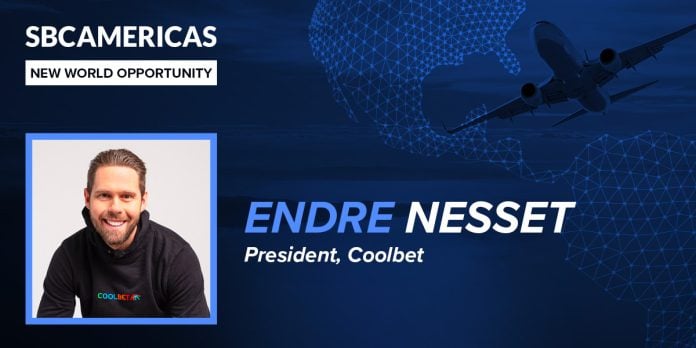When examining transatlantic business opportunities in betting, recent years have seen an abundance of European firms try their luck at the US – but with strong competition and often high costs, eyes are being increasingly drawn to the south.
In the latest interview in SBC Media’s New World Opportunity series, Coolbet President Endre Nesset provided an overview of how a firm with Northern European origins broke down Latin American barriers, having most recently launched in Mexico.
Not rocket science … but not easy
Home to a population close to 130 million, a huge sporting scene and plenty of passion for it, as well as the world’s 15th largest economy by nominal GDP, it is unsurprising Mexico has attracted Coolbet’s interest.
“We always review new markets, and there are synergies between a lot of our Spanish ones,” Nesset began. “We have a Spanish-speaking support setup and customer service, traders etc, and our site is optimized for this.
“In Mexico we just did our usual thing, looked at the metrics, population penetration etc, and it was one of the top markets on the list.
“There is no guarantee of success, but we are going to give it a crack! We have our office and local knowledge on the ground and couldn’t’ be more excited.”
Having tried and tested its approach to Latin American betting sectors in the markets of Chile, Peru and Ecuador – which we’ll explore later – the firm has approached Mexico with a similar strategy.
A common theme among the European firms we’ve spoken to for this series is hyperlocality, a factor which has filtered down through to both products and marketing.
“Our marketing strategy is to offer what is popular, focusing on Mexicans playing abroad like in the Premier League, Mexican boxers and UFC fighters. They are very proud people and very passionate.
“It’s not rocket science, but it is more difficult than people might think. We are fortunate enough to have our own tech stack and experts and localized traders, to be consistent and pull that through.”
Comparing Mexican consumer preferences to Coolbet’s home experience of Northern Europe, Nesset observed some key differences – obviously American sports such as the NFL have more of a following, but other more general offerings such as boxing have proven to be big winners.
He added: “If you are a Northern Europe centered operator, boxing is nothing special, you might get some bets on the outright. In Mexico, we could create 500 markets on Canelo Alvarez if we wanted to.”
Starting with a soft launch prior to the Super Bowl – a popular sporting event among Mexican bettors – Coolbet hopes to ‘build some good momentum’ via a customer centric approach, Nesset affirmed.
A key difference between Coolbet’s Mexican rollout and its history South American markets, however, has been that the firm’s latest launch was with a local partner, as opposed to Chile, Peru and Ecuador, due to regulatory requirements.
The road to Mexico
Having established itself in ‘the usual suspect markets’ of Europe, like any company experiencing upward trajectory, Coolbet began to analyze opportunities elsewhere, coming across Chile as a ‘potentially interesting’ prospect.
Nesset emphasized that a focus on a local offering has defined Coolbet’s stance on Latin American business from the outset. This is a common approach that the firm has applied to Chile, Peru, Ecuador and now Mexico, although of course there have been differences along the way.
“Our playbook is to really start focusing on the offering, bringing a new transparency and being very open about what we do,” he said. We have transparency functionalities that customers really like and appreciate.
“There were a lot of low value customers, and a lot of education was needed. We now see that players are catching up very quickly, similar to what has been seen in the US, with more demand for in-play, cash out, and advanced bet builders. There is always some luck involved, but to a large extent we made our own luck.”
In tandem with the firm’s hyperlocal strategy has been a key focus on sports betting, with much less emphasis on online casino – Nesset took pride in the higher proportion of sportsbook bettors to casino players on the firm’s platform.
When launching in Chile, the firm heavily relied on its sports focus and trading team, whilst also identifying that some popular competitions, such as the Segunda División, were not covered by some existing brands.
“One of our strengths is that our success markets are sports led, and we are a sports led brand in all means. Our aggressiveness on odds is our USP and is a key part of our marketing strategy.
“The Coolbet playbook is to do due diligence on the market, see the sporting interests and identify what is popular and what needs covering. If there were some niche events, we would factor that heavily into our marketing.”
However, regulation is a complex factor to consider in Latin America, often made more complex by political circumstances, perhaps best demonstrated by recent developments in Brazil.
In Coolbet’s experience, Peru has posed slightly more hurdles then Chile, but both have proven successful ventures, and Nesset was keen to emphasize that further regulation was more than welcome.
“When we launched in Peru we had a similar approach to Chile, but it was definitely trickier,” he explained. “There was a lot more bonus abuse, there were more syndicates, and that is still to some extent a challenge today.
“We’ve grown nicely and we really welcome the regulation. Almost all the Latin American countries are supposed to regulate next year.
“I’m not going to put money on it happening this year. There is a lot of political turmoil, and for them to prioritize gaming regulation, it’s not likely. At least in Peru they are further down the regulatory line than in Chile.”
A LatAm gold rush? Only time will tell…
Looking back on Coolbet’s early European history, Nesset noted that its markets in the north of the continent – Sweden, Norway, Estonia, Iceland and Finland in particular – are ‘some of the most well educated in the world’.
“Gambling has been a big part of culture for a long time, and the appetite for new products and innovation is huge,” he remarked.
This has impacted the brand’s Latin American rollout in two ways. In one aspect, the experience of well-established markets laid a solid foundation for expansion into some les mature South American ones.
On the other hand, player knowledge and education around betting was also significantly limited in comparison to the firm’s European customer-base, Nesset added, requiring a need for responsibility.
He said: “We are transparent, and responsible, and we consider ourselves the good guys. We have some neat functionalities showing income in tickets, people can anonymously copy each other’s tickets, and we have a winners map showing where the winning bets are being placed.
“In those less educated markets it has been an eye opener and has really helped to build the brand. We really tried to position ourselves as the sportsbook that is transparent and fair.”
The President also observed that in Latin American markets the brand’s Polar Bear logo has proven a hit with local audiences, laughing: “The polar bear logo is very popular – maybe people find it funny in the hotter climates!”
As observed in the Mexican market, Latin American countries have strong passion for sports, which in turn fuels a demand for betting as part of the sports entertainment ecosystem.
Parallel to this sporting passion is also increased education of players, as Nesset reflected that customers are ‘catching up quickly’ with their European counterparts, such as a rising demand for the same functionalities.
With the potential of regulation has come increased competition however, and Nesset shared that ‘some of the big guys are starting to move in’, as well as crypto providers, and so Coolbet is ‘always looking to improve and find new ways to stand out’.
Summarizing Coolbet’s LatAm experience and commenting on the region’s betting future, he concluded: “We have a proven concept in Latin American markets. We have done well in some, very well in some particular ones, and there is a lot of talk about regulation.
“In all our existing markets we will defend our positions and go for regulation, but we will never go for black markets. We will follow the regulation or withdraw.”














